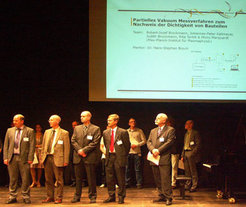First Prize for IPP Team in the Mecklenburg-Vorpommern VentureCup
Award for highly sensitive leak detection method developed for the Wendelstein 7-X fusion device

The “Ultra-Sniffer Test Gas Method” is used for ultrafast leak detection. It allows the tightness of components to be detected with extreme sensitivity appreciably faster and more reliably and simply than hitherto. Even tinyleaks, hitherto difficult or impossible to detect, can now be identified and even localised.
The method, for which a patent has meanwhile been applied for, utilises the Partial Vacuum effect. It was developed at the Greifswald branch of IPP for testing the tightness of components in the Wendelstein 7-X fusion research device. Its technological core piece – 70 large superconducting magnet coils cooled with liquid helium – is enclosed by a thermally insulating vacuum vessel because of the low operating temperature close to absolute zero. The vessel and the cooling pipes inside for transporting the helium have to be absolutely tight.
But it is not only in the construction of the Wendelstein 7-X large-scale experiment that the ultra-sniffer test is rendering good service. It could serve equally well, states Robert Brockmann, for beverage container or medicament producers and for the chemical industry, power plant operators or installation manufacturers, i. e. wherever fast and reliable leak testing is particularly important. Accordingly, Robert Brockmann is at present establishing the Lambda Leak Testing Company for exploiting the new method.
The MV VentureCup invites scientists from Mecklenburg-Vorpommern every year to submit innovative research ideas. The objective of the competition is to foster and support scientists with ideas affording founding potential.
IPP’s research objective is to develop a power plant that, like the sun, derives energy from fusion of atomic nuclei. For this purpose the institute at Garching is operating the ASDEX Upgrade fusion device, and at Greifswald the Wendelstein 7-X device is being built.
Isabella Milch
